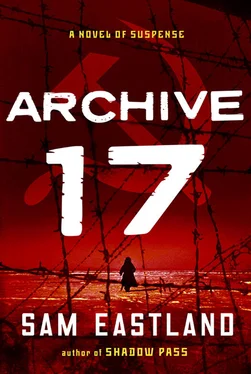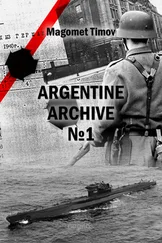Sam Eastland - Archive 17
Здесь есть возможность читать онлайн «Sam Eastland - Archive 17» весь текст электронной книги совершенно бесплатно (целиком полную версию без сокращений). В некоторых случаях можно слушать аудио, скачать через торрент в формате fb2 и присутствует краткое содержание. Жанр: Исторический детектив, на английском языке. Описание произведения, (предисловие) а так же отзывы посетителей доступны на портале библиотеки ЛибКат.
- Название:Archive 17
- Автор:
- Жанр:
- Год:неизвестен
- ISBN:нет данных
- Рейтинг книги:3 / 5. Голосов: 1
-
Избранное:Добавить в избранное
- Отзывы:
-
Ваша оценка:
- 60
- 1
- 2
- 3
- 4
- 5
Archive 17: краткое содержание, описание и аннотация
Предлагаем к чтению аннотацию, описание, краткое содержание или предисловие (зависит от того, что написал сам автор книги «Archive 17»). Если вы не нашли необходимую информацию о книге — напишите в комментариях, мы постараемся отыскать её.
Archive 17 — читать онлайн бесплатно полную книгу (весь текст) целиком
Ниже представлен текст книги, разбитый по страницам. Система сохранения места последней прочитанной страницы, позволяет с удобством читать онлайн бесплатно книгу «Archive 17», без необходимости каждый раз заново искать на чём Вы остановились. Поставьте закладку, и сможете в любой момент перейти на страницу, на которой закончили чтение.
Интервал:
Закладка:
The place was crowded with radio equipment, well-thumbed books of timetables, and requisition slips impaled on long metal spikes. Kasinec went over to the far wall, where a large map showed the rail system for the entire country, the tracks laid out in red like the arteries of an animal stripped of its flesh.
Kasinec’s finger traced along the line of the Trans-Siberian Railroad, through towns whose names had been smudged into illegibility by the constant jab of fingerprints, until it branched off and dead-ended just north of the border with China. “Here,” he said, tapping his fingernail against a patch of green, surrounded by a chalky whiteness on the map. “This is the Valley of Krasnagolyana.”
For the first time, as Kirov stared at the map, he understood the enormity of the task he had been given. Stalin had demanded the impossible. “It can’t be done,” he muttered. “I might as well give up before I start. How can I possibly track down anyone in that wilderness?”
“On the contrary,” Kasinec told him, “these men should be easy to find. If they have escaped from Borodok, they’ll naturally head towards China. Once they have crossed the border, they will be out of reach of Soviet authorities. If they head in any other direction, they will remain in Russia and it would only be a matter of time before they were recaptured.”
“So they head east,” said Kirov. “That narrows it down, but you have not exactly pinpointed their route, stationmaster.”
“Indeed I have. These men will follow the railroad.”
“Even if they are traveling on foot? What about the other roads?”
“That’s the thing, Major. In that part of the country, there are no other roads, especially at this time of the year. But the tracks of the Trans-Siberian are always kept open, no matter what the season or the weather.” Now he pointed to a red dot, which marked the next station on the eastbound route, some distance from the place where the Krasnagolyana railhead joined with the main route of the Trans-Siberian. The name of this place was Nikolsk, and it stood just to the west of a town named Chita. Here, the Trans-Siberian Railroad split in two. The north fork, which remained within the boundaries of Russia, made a wide arc through the towns of Nerchinsk, Belogorsk, and Khabarovsk before dropping south again to reach the port of Vladivostok on the Pacific Ocean. The other rail line dipped into China, cutting through the town of Harbin before crossing into Russia once again and terminating, like the northern fork, at Vladivostok.
“This is not only the quickest way for them to reach China.” Kasinec traced his finger along the southern branch. “It is, for all practical purposes, the only way.”
Kirov realized that everything the stationmaster had said made sense. He was still by no means convinced that intercepting Pekkala’s kidnappers could be accomplished, but the task no longer seemed to lie beyond the bounds of possibility.
“How long will it take them to reach Nikolsk?” asked Kirov.
“From Borodok? Five days, maybe, if they are traveling on foot. If they have sleds or skis, it could be only half that time.”
Kirov walked to the door and looked out over the empty rail yard. “And no train for three days.”
“That is correct, Comrade Major.”
“And three days from now, if I do climb aboard that train, how long will it take to reach Borodok?”
“A week at least, more likely two. And Borodok has its own rail line which branches off the Trans-Siberian. No trains are scheduled to arrive in Borodok for another month. The best they could do is drop you at the railhead and you could make your way on foot to the camp, although I expect you might freeze to death first.”
Kirov felt a weight settle on his heart, as if someone were kneeling on his chest. “So it cannot be done after all.”
“I did not say that, Comrade Major.”
Kirov spun around. “Then what are you saying?”
“I do have one idea. But what I have in mind requires knowing friends in high places.”
Kirov tapped the passbook in his chest pocket. “If my friends were any higher, Comrade Kasinec, they would die from lack of oxygen.”
It was after dark when Sergeant Gramotin and the six guards he had ordered to accompany him trudged out of the camp.
“Are you sure this is a good idea?” asked one of the guards. “Going after those savages at night?”
Gramotin did not reply. He was so disgusted with the way his men had behaved when the attack broke out that he could not bring himself to answer their stupid questions. If they had performed as Gramotin had trained them, not a single convict would have escaped and the Ostyaks would now be lying dead in a heap in the middle of the compound. Instead, his men had fled en masse to the guardhouse and barricaded themselves inside. He would have liked to execute the whole lot of them on the spot, and except for the fact that this would have required at least two of the guards to help him with the paperwork afterwards, since Gramotin could not read or write, he would have killed them all by now.
For Gramotin the only bright spot in this otherwise shameful and disastrous day was that Klenovkin had shot himself. Dead men made excellent scapegoats, and now the blame for the escape could rest entirely with Klenovkin. Had he lived, the commandant would have wasted no time blaming someone else for the catastrophe and Gramotin knew full well that it would have been him.
Gramotin realized, however, that this did not let him off the hook entirely. As sergeant of the guard, he was obliged to account for his actions. In his mind Gramotin had already voyaged ahead to the hearing which would undoubtedly take place. The first question they would ask, those stone-faced functionaries of the Dalstroy inquiry board, would be if he had made any attempt to pursue the men who escaped. If his answer was no, the inquiry would convict him of negligence. That would be the end of his career and probably his life as well.
This was why Gramotin had decided to set out now, even though he had serious doubts as to whether he and his men were any match for the combined force of those sunburned, reindeer-herding primitives and the tattooed Comitati, whom he despised every bit as much as they loathed him.
After an hour of marching, they came to the place where the Ostyak sleds had turned into the woods. The snow was deeper here and the going made harder for Gramotin by two ammunition bandoliers he carried crisscrossed over his chest. By holding a candle lamp in front of him, he was able to see the sled tracks, even though they were now almost covered by the falling snow.
After a few dozen paces, Gramotin stopped to catch his breath. “All right,” he wheezed, “two minutes’ rest, but no more.” It was at this point that Gramotin realized he was alone.
The other guards were still back on the road.
Gramotin raised the lantern. Shadows seesawed through the trees, obscuring his view of the soldiers. “What’s wrong?” he shouted. “Why have you stopped?”
“You can’t expect us to chase them into the forest,” called one of the guards.
“And in the middle of the night,” another man chimed in.
“That is exactly what I expect! If we wait until morning, they’ll be too far away to catch. Now then! Who is with me?”
The only reply he received was the sound of wind through the tops of the trees, like static on a radio.
Cursing wildly, Gramotin made his way back to the road and discovered, to his astonishment, that his men had disappeared. Their footsteps in the snow showed that they were already on their way back to camp. “Bastards!” he howled into the dark.
The darkness swallowed his words.
In that moment, he realized how much he missed Platov. “Platov would have stayed with me,” muttered Gramotin. When he thought of the dead man, kneeling in a pool of his own blood, tears flooded into Gramotin’s eyes. Angrily he wiped them away with the rough wool of his glove. I will kill them for this, he decided. I will kill them all, guards and prisoners alike, starting with Inspector Pekkala.
Читать дальшеИнтервал:
Закладка:
Похожие книги на «Archive 17»
Представляем Вашему вниманию похожие книги на «Archive 17» списком для выбора. Мы отобрали схожую по названию и смыслу литературу в надежде предоставить читателям больше вариантов отыскать новые, интересные, ещё непрочитанные произведения.
Обсуждение, отзывы о книге «Archive 17» и просто собственные мнения читателей. Оставьте ваши комментарии, напишите, что Вы думаете о произведении, его смысле или главных героях. Укажите что конкретно понравилось, а что нет, и почему Вы так считаете.











